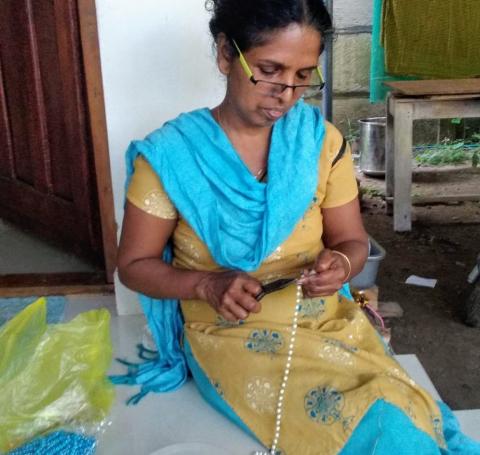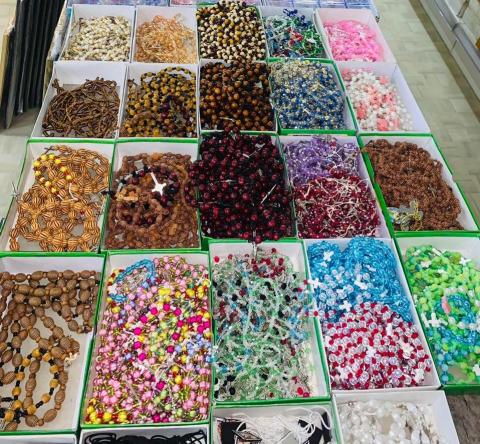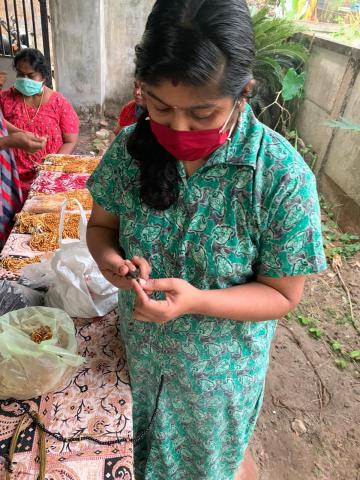Turning beads into elegant rosaries isn’t merely Vilma Antony’s sustenance. It’s her spiritual calling.
She counts the prayers of thanksgiving, devotion, and confession as she strings her silver beads, interspersing this activity with gospel readings at her village home a few miles from the South Indian port city of Kochi. She’s joined by 10 other women who sing and narrate folk stories as they string the sacred prayer beads through the afternoon.
Antony’s home is among 2,000 others in Koonammavu — a northern suburb of Kochi city— that has nurtured rosary making for over two centuries. The villagers call it their “little Rome” from which they ship rosaries to different parts of India and beyond, including the United States, Europe, Africa, and Middle East.
vilma.jpg

prayer bead at her home. Photo courtesy Rinton Ravi Jose.
“I learned this craft from the grandmothers of our village who learned it from their grandmothers,” says 55-year-old Antony. “Making rosaries has brought me closer to my spiritual center and helped me support my family.”
Growing up, Antony said she remembers her village elders narrating the history of their meticulous craft through stories and moral teachings. Over time, rural women made rosary making the backbone of their village economy — and helped mark Koonammavu’s place on the global map.
Rinton Jose, an entrepreneur whose family has been selling rosaries for more than 40 years, says his customers are scattered across the U.K., Dubai, Mauritius, and Brazil. From pearls to stones, brass, and crystals, his orders are customized by village women who spend over eight hours a day beading brass wires and nylon twine.
“Even though the coronavirus has for the first time dented our business, we’ve received wholesale orders from California and Mauritius,” Jose told Sojourners. “But business has slumped to one-fourth for smaller merchants.”
The state of Kerala, where Kochi is located, has reported a high number of active coronavirus cases since the surge in India last September. Despite state health minister KK Shailaja’s celebrated efforts at fighting the pandemic, Kerala is currently reporting one of the highest per capita COVID-19 rates in the country.
With no government backing or support from village cooperatives, the rosary makers are increasingly relying on community support to keep Koonammavu’s centuries-old tradition alive.
“Many families were able to send their children to school and keep their households afloat through this business,” says Sharda Sakesh, a homemaker who has been beading rosaries for more than nine years. “Now, we are turning to each other for help or to the church for guidance.”
Economic and spiritual empowerment
For Koonammavu’s residents, the local church has not only been a psychological balm amid the pandemic, but also a vital reference point in their long tradition of beading.
rosary_shop_1.jpg

Photo courtesy Rinton Ravi Jose.
Built in 1837, St. Philomena’s Forane Church in Koonammavu has stood witness to women’s economic and spiritual empowerment. In 1866, locals say, Catholic priest and social reformer Saint Kuriakose Elias Chavara founded another women’s congregation in the village to support women’s education and life skills.
Father Jose Kuriedath, a priest at the Carmelites of Mary Immaculate — a scholarly religious congregation of the Catholic Church in Kochi — says Chavara wanted the congregation’s women to be independent at a time when missionary schools mostly catered to boys’ education.
“Saint Kuriakose believed rosary making would help girls supplement their family incomes,” Kuriedath said. “Then slowly, the demand for rosaries started growing and families became involved organically.”
What started as a congregation-based initiative later expanded when rosary merchants started working with village women, and then passed on the rosaries to businesses that exported them all over the world.
“While on the one hand, the tradition started dwindling at the congregation,” says Father Fabian Chakiath, an 86-year-old priest in Kochi, “the shopkeepers and merchants started popularizing Koonammavu as a rosary hub.”
Chakiath believes the historical roots of the tradition point to the spiritual consciousness in their society.
A multifaith effort
At Koonammavu, rosary making is grounded in the devotion of the people to their faith, as rosary recitation is common at family gatherings, holy communions, and weddings. In the tightly knit community, Hindu and Muslim families have embraced rosary making as part of a shared tradition. As the business has grown, the rosary has become an important part of prayer and ceremonial rituals across different faiths.
“Despite the commercialization of our tradition, rosary making isn’t just a money-making venture for us,” says Shabida Sunil Kumar, a Hindu homemaker who recites the rosary as part of her prayer rituals. “It’s about community solidarity, interfaith worship, and cultivating a more meditative approach toward life.”
women_4.jpg

Photo courtesy Rinton Ravi Jose
Mary Sanjhu, an 85-year-old Catholic woman from a neighboring village, says she has made more than 2,000 rosaries over the last decade. Despite her poor eyesight, she believes recitations have kept her spiritually awake.
“Kochi is an ecologically conscious society and there’s a thrust on simple living,” Sanjhu said. “By staying close to our faith, we pass on these values to our children so that the cycle carries on like the beads in a rosary.”
An uncertain future
Even though the rosary making tradition has continued uninterrupted for centuries, the coronavirus has cast a pall of gloom on Koonammavu’s future as a rosary hub. Businesses have halted and women are left without work.
“We’ve been taking loans to stay afloat,” said a village elder. “If earlier we made 100 rosaries a day, now we are down to less than 20 even though business has recovered a bit over the last couple of months.”
Encouraged by their families and priests who say it may take years for the situation to resolve, some merchants have turned to Indigenous food production businesses to recover their losses.
“I had a major export business in Italy, but now everything has ground to a halt,” says Anthony Jacob , a local businessman. “Even the churches have stopped taking orders and the priests are unsure of our future.”
The women are the hardest hit since the sacred beads have remained central to their social and spiritual lives.
“It is this devotion that has touched all our lives,” says Vilma Antony, as she finishes her last symbolic wreath of beads. “We can’t push against fate, but we need to find a way to keep our ancient spiritual tradition alive.”
Got something to say about what you're reading? We value your feedback!








